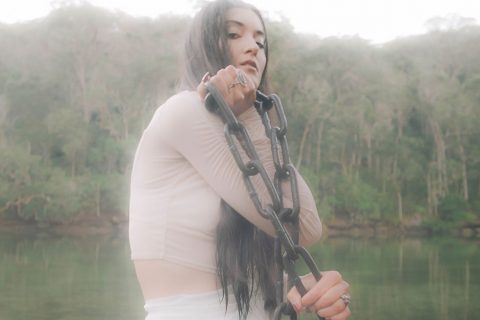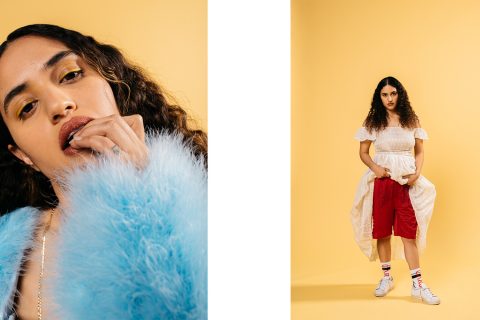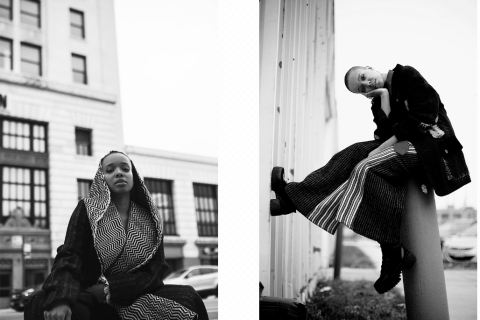
“I’m a cry baby, just like my mother,” Rainbow Chan laughs over the phone. She laughs heartily, encouraging you to join in. As a child, she was “always the clown”, which explains the colours, the playfulness, the extra. Her friends tell her that her voice carries across rooms and streets—an important trait to have when finding your feet in the Australian music industry.
On June 28th, the last Friday of the month, Rainbow released her second album Pillar. Glitchier than Spacing, her 2016 debut, the new album borders on erratic. Pillar is the embodiment of Rainbow’s experimental nature. On ‘Lull’ she pushes club heavy beats against sampled folk songs from her mother’s Weitou upbringing. On ‘CSR’ she shifts between Cantonese, Mandarin, and English. Pillar is an album about family, home, change, time, and movement.
And move she does. Rainbow’s energy seems abundant: she’s a tutor at the Sydney Conservatorium of Music and, alongside her Rainbow Chan project, she also performs as Chun Yin, and as one half of DIN, a creative project with her friend Alex Ward. For the last few years, she’s flown back and forth between Sydney and Hong Kong to learn Weitou, a dialect of Yue Chinese. It’s a process and, like most things, Rainbow Chan is throwing herself in wholeheartedly.
What does a typical weekday look like for you?
If I’m not uni teaching—I’m on uni break at the moment—I’m usually just sleeping in. [Laughs] And enjoying as much sun as I can get on a winter’s day. I’m trying to actively put my phone down and go for walks and go to the pool for a swim. It’s always nerve wracking around album campaigns and stuff. You don’t want to be obsessed with checking stuff. I just like to leave everything in the house and go for walks.
How are you feeling now that the album is out?
I’ve actually been feeling really good. Number one, the support for this album, so far, has been astounding and really wonderful. I’m so grateful for people’s responses. I think I’ve got a really good team around me this time, in terms of my manager and the visuals and the video clips that are accompanying it. I feel like there’s this whole community that’s on the ride with me. As well as involving my mum in this record and learning traditional folk songs that are from her heritage in Hong Kong. It feels like there’s a wider reflection of different elements from my life. It’s not as insular, which has allowed my sentiments for this record to be less like “my kids are graduating”. It’s a little bit more outside of my own head and about a wider spread of people.
Would you consider yourself an introvert or an extrovert?
I think I’m an extrovert. If I said I was an introvert, people would laugh. I’ve always been the clown! I’m a bit ridiculous and very loud. My friends are like “Oh my god, your voice just penetrates the air!” But, to be honest, I feel like in the last couple of years, while I’m still quite extroverted, I think I’m pulling back a little bit in terms of having more me time. It’s necessary. I feel a bit more grounded.
What were you like as a kid?
I loved any opportunity to be in a talent show. Literally every year from Year 6 to Year 12, I was in every school talent show. I was also quite a friendly kid—I liked being friends with everybody. I was quite chill in a sense, I wasn’t into picking fights.
What kind of music did you listen to?
There was a lot of mish-mash of things [because] I come from a family that moved from Hong Kong. So we listened to a lot of Canto-pop. But my grandma in Hong Kong hated Chinese music. She really liked Elvis. So we listened to a lot of golden oldies—Roy Orbison and the like. She would record these mixtapes off the radio by her bedside and she would send us these cassettes of songs that she’d recorded. We’d listen to those in the car all the time. So there was that, alongside Britney Spears and Justin Timberlake and Video Hits and Saturday mornings. So it was quite wild and really fun.
Did you watch a lot of Rage?
Yeah! I watched too much Rage and too much SBS. I would go through the TV guide and make sure that the movie had an ‘X’ next to the classification and I’d watch that. My parents were working so me and my sisters would do whatever we wanted to!
What age did you start going out? And where?
I specifically remember the very first time I went to a party. I feel like growing up in a fairly conservative Chinese family, I was a little bit of a “goodie goodie”. I didn’t drink, I didn’t smoke, I didn’t party. The very first time I got invited to a party, I dobbed myself in! I remember saying to my older sister, “I’m really sorry! I’m going to this party! There’s going to be drinking and smoking, and boys.” My sister was like, “Okay, well you can go but if you do anything the shame will be yours to carry.” [Laughs] I was 16 years old. My parents have definitely chilled out. I was never a super rowdy or naughty kid, so when I ended up partying and clubbing it was rather controlled. There have been messy times and messy nights, but overall I never felt like I had to go hard.
Do you still enjoy going out?
[Laughs] Yeah! I always talk about this with my friend Alex who I’m in [DIN] with. We like playing a lot of club nights, but we’re always so excited about going home and having a hot bath. I’m always thinking, Oh, I can’t wait to go home and have an ice-cream and sit in a hot bath afterwards. I admire those people who can really go hard and have an amazing time. But I don’t have it in me anymore. Every now and then I’ll do it, but I really need to recover—for a week.
“But my grandma in Hong Kong hated Chinese music. She really liked Elvis. So we listened to a lot of golden oldies—Roy Orbison and the like. She would record these mixtapes off the radio by her bedside and she would send us these cassettes of songs that she’d recorded.”
With this album, Pillar, what time of day were you most creative?
I used to be a really night oriented person. Then I got a teaching job where I had to rock up to lectures on time. Then my routine shifted. So it’s not so much about time… I really like the atmosphere of night-time sessions. But I think it’s not so much pinpointed to an hour or some sort of day/night-time/evening thing. It’s more so me going off something that happened that day. It could be like a spark that comes from a conversation, from looping a single word on a page of a book that I’m reading and thinking about the meaning around this word or its history then what could that entail. I think it’s based more around moments rather than a time.
I really appreciate that concept. I know that you really love Ren Hang.
Yes! I remember discovering his photos when he was just starting out and thinking, Oh my god! What is this? This is so beautiful and so distinct. Sadly, he passed away a year ago and it was such a shock. He was so young. Later on, there were people that I met when I was going back and forth between Hong Kong and China and Australia that were his close friends. In particular, these two friends of mine that run a fashion label in Hong Kong. Anyway, I didn’t know it at the time but they appear throughout. [The book Ren Hang by Ren Hang]
After connecting all the dots, I realised how badly I needed to buy the book. Earlier this year, I was in a show at a gallery called Cement Fondu in Paddington. They had a show called Stop Peeping which had a few Ren Hang photographs. I was exhibiting at the same time within a space called Project Space within the gallery. I couldn’t believe my work was in the same gallery as Ren. I didn’t imagine four years ago that it would happen. I felt like I needed to buy his books as a respectful gesture to everything he’s done to inspire my music and the aesthetics I’ve created. I really wanted to feel gratitude for this moment of exhibiting alongside his photos.
Absolutely. What’s one of the best live shows you have ever seen? Because I know you’ve seen Bjork live in Iceland…
Oh my god! That was like a religious experience. I cried. I’ve seen Bjork play four times and each time she’s blown me away. I feel like I see live music so often. It takes something quite expected to really move me. Even if someone is really technical or there’s pyrotechnics or [it] has really high production.
I saw BLACKPINK in Seoul in Korea and that was amazing. But part of why I loved it was because I missed the opening two songs, I was late, I was there by myself. I had no idea what my ticket said because it was [written] in Korean. I remember being really stressed but loving it. It was a great performance because of that. I’ve just seen so many amazing performances I couldn’t pick one. Solange was amazing. Joanna Newsom, even though she played solo on Australia Day in 2007, she was life-changing.
So you teach a Bachelor of Contemporary Music at the Sydney Conservatorium. What does contemporary music mean to you?
For our degree, it’s very much a popular music degree. Anything from Top 40 pop to folk to rock to experimental, soundscape-y stuff to dance music. The only requirement is songs under five minutes—if that kind of contextualises things. What I’m really excited to teach is the sort of social and political theories around pop music from the 20th to the 21st century. Looking at [it] through the feminist perspective or the intersectional meanings around pop music and the power that’s embedded in these cultural forms.
How does that come through in your music? How does that ideology manifest itself for you?
On Pillar there are specific songs that speak to that. In particular, there’s a song called ‘Lull’ that’s a reworking of a traditional lullaby that I recently learnt in Hong Kong. What I think is political in that gesture is that the folk song is in an indigenous Hong Kong dialect called Weitou. It was very much looked down upon. And in the ’60s, as Hong Kong was urbanising, they phased it out and in that school year you had to learn Cantonese. My mum is Weitou, that was her mother tongue, but now she doesn’t really speak it. She can speak to her sisters, but it’s a disappearing language.
I really wanted to learn about it and pick it up and my mum suggested that song was a really great way for me to commit a lot of this to memory because it’s a dialect [that] is oral, there’s no written documentation of it. So, the last two years I’ve been flying back to Hong Kong to learn these songs and the history and narratives around the music. Incorporating this supposedly dying language in a club track, seems like a pretty radical move I guess. I think only public provocation causes people to ask questions or be intrigued. I’m trying to make sure that language doesn’t die out and that those questions are being heard.
It’s important work.
I was nervous to put it out because there’s so much responsibility in working with traditional music. And in making sure that the gesture isn’t a deep appropriation of folk music from wherever they got the sample from. But I guess, part of what pushed me was the thinking of, No, actually, I’m reclaiming that narrative because I’m someone from that background and I don’t see this culture as belonging in a museum. Why can’t we live it and have it be celebrated and be pushed to the fore? There’s an inherent tension in that, but I’m really excited to see the response so far, which has been really positive from people both in the community, as well as outside the community.
“Incorporating this supposedly dying language in a club track, seems like a pretty radical move I guess. I think only public provocation causes people to ask questions or be intrigued.”
That’s really exciting! The last song on Pillar, ‘Roof’, is dedicated to mothers. So, what’s your mother like?
My mum! To be honest, I have to say that I was really scared of her as a kid! She’s gonna kill me for saying this—it’s because she would lay down the law. Over the years, she’s mellowed out and in [me and my sister’s] adult life we’ve really bonded with our mum. She grew up in poverty in rural Hong Kong. Her parents were farmers and they literally had nothing. To think that now she’s in a different country, she’s using an iPad, she’s learning English. That transition within a lifetime has always been very inspiring to me.
I’ve seen my mum be very resilient and even though she wasn’t educated, she does a lot of learning herself. She has a DIY mentality, which has influenced me so much because a lot of what I do is very DIY—trying to teach myself all these new skills. Never expecting anything to be handed to you, which I think comes from my mum but also my dad in a sense. That resilience, that strength, and being proud of being a woman and being strong in that. She’s the matriarch of a family of four girls—she really taught us to be strong, independent women. But she’s also a cry baby. [My mum] describes her mum as a cry baby, crying all the time. Just like me. [Laughs]
This interview was edited for clarity and length.
For more on Rainbow Chan follow her here.



